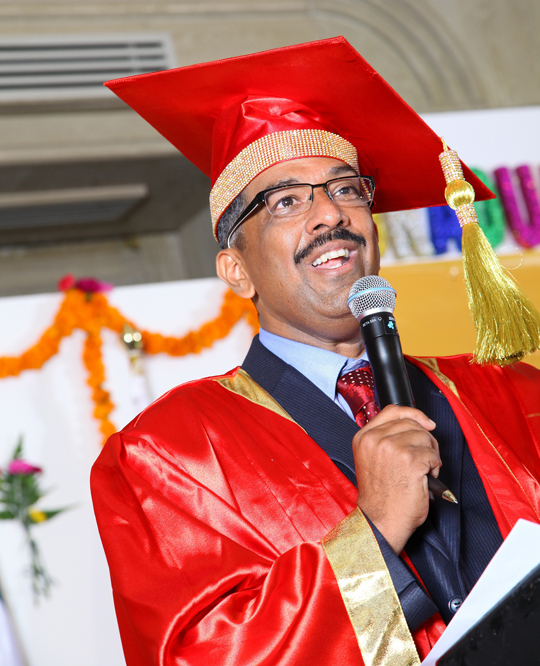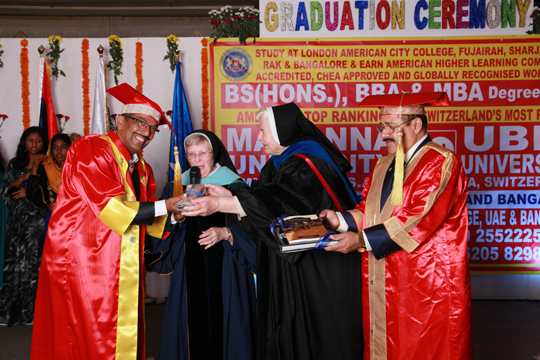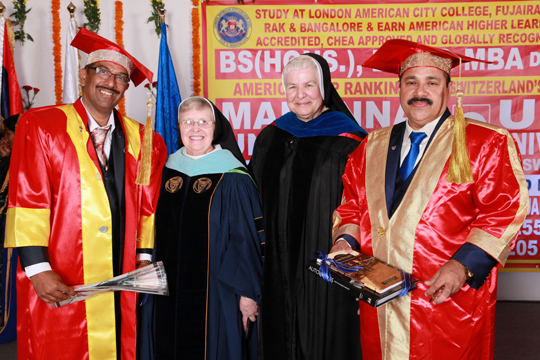Dubai, Jun 18: Dr Kaup Mohamed, the Dean and Director of the London American City College, who hails from Kaup in Udupi District, has been conferred with a Doctorate in Business Administration from the Apollos University, California, USA.

The Board of the Apollos University in California and the Board of the Euro College and several other dignatories, faculty members, staff members, students and the Guests congratulated Dr Kaup on receiving his Doctorate.
Dr. Kaup was conferred with the Doctorate in Business Administration from Apollos University, USA for his thesis titled "A Critical Evaluation of Skills of Today's Students in Leading a Managing a Business Enterprise in the UAE". The dissertation committee was chaired by Dr. Paul Eidson from Apollos University, California, USA.
The leadership programs are becoming more remarkable and important in the Colleges and Universities which enables the students to become a good and efficient leader for industrial enterprises. The student community is not taking studies seriously. They neglect their studies and are not interested in developing their skills successfully. In this research, the student's capabilities are checked as to whether a student in the current environment has learnt the requisite skills required for leading and managing a business enterprise.
This research emphasised on analyzing the skills obtained during their learning environment in the Colleges. This research also reflected on the leadership qualities and analyzed whether the students are also using and applying their 5 performance objectives.
This research investigated the learning skills of the students and also compared the entrepreneurship skills and behavior of working and non-working students in managing business environment. This research also investigated the capability of current students in accepting risk & challenges in managing a business enterprise. The core intension behind the research was to evaluate the skills of today's students in leading and managing a business enterprise in the UAE. The questionnaire covered 13 sections namely (A) Entrepreneurial Skills (B) Ethical Responsibility (C) Innovative skills (D) Leadership skills (E) Learning Skills (F) Oral communication and presentation skills (G) Planning and Organizing skills (H) Risk management skills and responding to change (I) Self Management skills (J) Team work skills (K) Setting goals and time management (L) Negotiation and decision making and (M) Attitude and behavior skills.
Dr. Kaup has contributed and researched immensely on knowledge management with a teaching experience of more than 25 years and Deanship for more than 18 years. Dr. Kaup has spent his whole life in academics, education and research. Dr. Kaup has won several awards in the field of management research and development, project research and development and is an excellent academician with immense research oriented knowledge.
Dr. Kaup Mohamed is the only one person in Beary community currently holding 9 Doctorates in various fields of study from India and abroad. Dr. Kaup has published several scholarly research articles and a thesis in strategic Management area and other allied areas of management.
Dr. Kaup has visited several countries namely USA, UK, Netherlands, Belgium, Denmark, France, Germany, Austria, Macedonia, Singapore, Thailand, Spain, Russia, India, Australia, New Zealand, Srilanka, Turkey, etc. for delivering his lectures.
Dr. Kaup has won several national and international awards. His current area of research interest is in Business Strategies, Operations & Production Management, Quality Management, Consumer Protection Law, Creative Problem Solving – A Total Systems Approach, Decision Making, Organizational Behavior, Human Resource Management, Business Project Management, Marketing, Strategies for Success, etc. His research paper on “Customer Relationship Management that aids in customer-centric processes” was published in “The Observer of Management Education” Journal. His latest publications including "Development of New Concepts and Purposes add value to CRM" etc. are featured in the International Journal of Management Research and Review, International Journal of Research in Commerce, Economics and Management in the area of strategic management, etc.









Comments
Masha allah ..great achievement
Great achievement....Congrats
CONGRATULATIONS SIR!
Add new comment